| |
|
|

I just recently came across conservative
commentator Star Parker’s
January 18 article “The Credibility of Black Conservatism,” in
Townhall.com, a conservative Web journal. Parker’s piece was
apparently prompted by the storm then surrounding Armstrong Williams,
the discredited black radio and television commentator. Williams,
we recall, got in trouble when it was revealed that he received
payment from the U.S. Department of Education to plug George
W. Bush’s “No Child Left Behind” program.
In the interest of disclosure, I am a self-described progressive/leftist.
But even though it might seem I do not share much in common with
conservatives, I do not subscribe to the proposition that one
side of the ideological divide has a monopoly on truth. So, I
do often give the conservative side the benefit of the doubt.
At least I think many do operate with good motives.
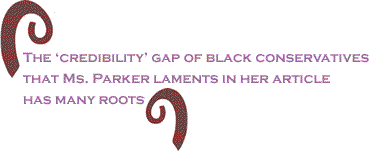
However, as an African, and resident of the
(black) south side of Chicago, I have often wondered why the
black conservative
view has such poor resonance in African American communities.
One of the most popular explanations, offered by black conservatives
themselves, is that the “liberal media” caters to traditional
black leadership at the expense of alternative voices. While
there may be a grain of truth to this view, I would like to suggest
that the answer is a bit more complex. In fact the “credibility” gap
of black conservatives that Ms. Parker laments in her article
has many roots.
First, I think tone and language matters.
When I heard Star Parker suggest on Fox Television News that
New Orleans’ black
residents suffered from a “welfare mentality” I cringed, was
angry and overwhelmed with deep emotion. I thought to myself,
even if for a moment this were true, it is not the way anyone,
black or white should be sounding in a time of such despair for
that community. Although it was not readily apparent to me what
Parker meant, I know that the term “welfare mentality,” used
in certain contexts, is a provocative term. And for those among
Katrina’s victims who work hard and do not receive welfare, I
thought it would be particularly offensive.
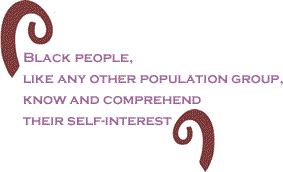
But it seemed particularly mean-spirited
for Parker to say this at such a crisis moment for black Louisianans.
This tone, and
the reflexive, single-minded identification of black people with “welfare” is
not conducive to a healthy dialogue between conservatives and
the black community. Surely, Parker cannot think this kind of
attitude will move large numbers of black people to her side.
Moreover, such harsh words about black people are at once hypocritical
and one-sided: How often is “welfare mentality” ascribed to white
people on the receiving end of government largess after a disaster?
How many times have government emergency services been used to
rescue white adventurers stranded on mountain tops or snow slopes
while engaging in voluntary activity such as hiking or skiing?
But we never hear black conservatives suggest that there is a “welfare
mentality” at work there. I think most people would agree that
people caught in a natural disaster have a better claim to government
services. But, maybe to black conservatives the stranded white
adventurer is more deserving, somehow.
Blacks aren’t voting liberal-Democratic because they are simply
misled by Jesse Jackson and the civil rights leadership, or because
they have a “herd mentality” as conservatives often contend.
It would be condescending to deny the fact that black people,
like any other population group, know and comprehend their self-interest.
The black community is voting against what it hears, or does
not hear, from black conservatives. Here are some examples:
-
Minimum Wage and Living
Wage: Black conservative opposition to raising the minimum
wage and rejection of living
wage proposals across the country puts them squarely at odds
with the vast majority of black people who are stuck in low-wage
jobs. Blacks do not buy the defense that these regulations “stifle” business
profitability and undermine job creation. It is hard to convince
these black workers when, for example,
Wal-Mart made $10 billion last year in
profits and Alice Walton, heir to the Wal-Mart fortune, just
purchased a painting for $35 million at a NYC auction! Americans
overwhelmingly agree that people who work should not have
to be impoverished, that able employers such as Wal-Mart
should pay a living wage;
-
Speaking out against
racism: Black conservatives seem unable to instinctively
convey revulsion over racism
or its vivid manifestations. When a James Byrd is dragged
behind a pickup truck, crosses are burned in front of black
homes, or a Trent Lott or William Bennett utters racially
offensive rants, black conservatives need to be as resolute
as Jesse Jackson in criticizing it. The only comments I heard
from black conservative leaders after the James Byrd murder
was a call to reject the “politicization” of the issue by “liberals” and
to reject calls for hate crime legislation. While hate crime
legislation is certainly debatable, it shouldn’t be the first
and only time black conservatives are involved in the conversation.
They too, as black people, should share in the revulsion
and be front and center in protesting gruesome racial violence.
That’s where credibility and authenticity comes from. And,
here’s a secret: Jackson keeps his credibility among many
blacks precisely because he speaks out. Black conservatives’ failure
to respond forcefully to such outrages only feeds the suspicion
that they have essentially declared racism a thing of the
past, that it no longer has urgency. This is a source of
the credibility gap that Parker bemoans;
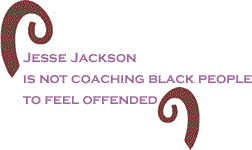
-
African Americans respect
intellectual and political independence: Right or wrong,
black conservatives
are often seen as defenders of, and apologists for white
racism. John McWhorter, an African American scholar at the
Manhattan Institute has defended, as have many other black
conservatives, William Bennett’s recent offensive remarks,
dismissing them as just “hypothetical.” For many in the black
community, conservative commentators who cannot call these
offensive remarks what they are lack independence, are morally
bankrupt and intellectually dishonest. When something so
blatantly offensive is uttered by people of such influence
as Bennett, black conservatives need to stop the knee-jerk
defense and simply call it for what it is. I live in the
black community and I know there is universal revulsion over
these remarks. Jesse Jackson is not coaching black people
to feel offended. Black people know racially offensive stuff
when they hear it. Quite frankly, there is no way that black
conservatives can make inroads into black communities while
giving aid and comfort to such contemptible views;
-
Affirmative action
matters to black people. The knee-jerk references to “merit” and “qualification” made
by conservatives every time affirmative action is debated
lack credibility, especially now when the Bush administration
is stacking government bureaucracies such as FEMA with incompetent
friends. In light of such obvious cronyism, opposition to
affirmative action is seen merely as a conservative strategy
for maintaining white privilege. And please, conservatives
should drop the charge that affirmative action “stigmatizes” black
people. Racism is what stigmatizes black people. We should
not blame the solution. Furthermore, no one should think
for one moment that Michael Brown ever felt “stigmatized” by
taking a job at FEMA for which he was unqualified;
-
The environment and workplace safety matters:
Environmental racism is a reality. As long as black conservatives
are seen as defenders of an unfettered free enterprise system
that disregards the environment and public safety, no one
in the black community will take them seriously. After all,
black communities are disproportionately affected by diseases
such as asthma, cancer and heart disease, maladies that have
a strong environmental dimension. Black conservatives need
to stop apologizing for negligent corporate conduct and support
positive action to reduce pollution.
-
Katrina has deepened
black opposition to the Iraq War: Regardless of its merits,
the failure of
the government to respond to Katrina’s victims has deepened
black opposition to the Iraq War and exacerbated an already
palpable backlash. The most common refrain here in Chicago
runs like this: “black kids are dying trying to bring 'democracy'
to the Iraqis and our government can’t even rescue our people
from a flood in New Orleans.” Black conservative commentators
who uncritically cheerlead for this war are seen as out of
touch with the needs of Black America and sharing the “lopsided
priorities” of this government;
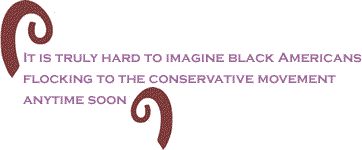
-
Historical racism:
Any analysis of the present black condition that denies
its link to historical
racism, seeks to locate the “black problem” wholly within
the individual and denies the presence of structural barriers
to social and economic mobility will not be taken seriously.
Black conservative attacks on government belie the positive
and legitimate force that government has been in advancing
black interests. Such attacks provoke a well deserved rebuke
from black beneficiaries. Black people share an understanding
that the federal government, no matter how flawed or inadequate,
has been a positive force in their lives, an equalizer that
forced open the doors to higher education, gave access to
affordable housing, invented Social Security, Medicare and
yes, welfare, and has sought justice, albeit belatedly and
often inadequately, in defense of black civil rights. The
recent conviction of KKK member Edgar Ray Killen in the murders
of civil rights workers Chaney, Goodman and Schwerner is
a notable example. Obviously, it is legitimate to criticize
governmental failure. However, black conservatives too often
sound as if government is the enemy of black people, and
come perilously close to embracing the radical libertarian
premise that people should be left to the vagaries of the
marketplace, and everything will be just fine. Black people
do not subscribe to this view. The fact is there is no level
playing field for everyone and, especially in the current
economic climate, it is ever more necessary for the government
to assert its role as a counterweight to corporate
excesses (have we forgotten the Savings and Loan, Enron,
Global Crossing, Tyco Xerox scandals?);
-
Foreign policy for
the people: Black conservatives’ uncritical
support for trade deals such as NAFTA and CAFTA that have
played a role in the de-industrialization of American cities
will win them no allies in black communities. And black people
view with suspicion conservative attacks on leaders such
as Hugo Chavez of Venezuela that do not acknowledge the source
of his popularity: the largest share of the county’s oil
revenue goes to fight poverty. Black conservative attacks
on Chavez fuel suspicion that they only care about protecting
American oil interests. And black people remember that during
the anti-apartheid struggle, many black conservatives
aligned themselves with the white establishment here, which
sought to protect white minority interests in South Africa
at the expense of blacks. And it is worth noting that in
1986, President Reagan vetoed a strong sanctions regime against
South Africa and Dick Cheney, then a member of congress,
dismissed Nelson Mandela as “terrorist.” The black conservative
movement has never tried to disassociate itself from this
kind of racial bias in foreign policy. It is truly hard to
imagine black Americans flocking to the conservative movement
anytime soon, given its attachment to the historically racially
insensitive foreign policy establishment.
-
Racial discrimination
is a reality: The wave of successful class-action suits
in recent years (against
the FBI, Denny’s, Wal-Mart, and so on), funding inequities
in education, disparities in the criminal justice system
(17 black inmates have been released from death row in Illinois,
vindicated by DNA evidence), discrimination in employment
(ironically, with the exception of Fox News Sunday, Sunday
morning TV news programming in the “liberal media” is now
off-limits to black commentators and opinion makers), all
conspire to undermine black progress. Black conservatism
that does not acknowledge this contemporary reality will
not attract black followers;
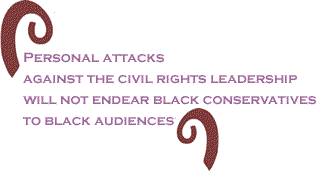
-
Attacks on black leaders:
No matter what they think of Jackson, Sharpton, Representatives
Maxine Waters,
John Lewis and others, black conservatives’ vitriolic attacks
on the black civil rights leadership will never work. Whatever
the merits, when Star Parker, Armstrong Williams, Larry Elder
and other conservatives attack black leaders in a personal
way (as opposed to reasoned, honest and constructive engagement),
they are seen by many black people simply as attack dogs
for the white Republican establishment. I have listened with
disbelief to language used by black conservative commentators
and wondered whether they want a real debate, or just
to humiliate the opposition and score points. I’ve heard
Jesse Jackson and Al Sharpton described as “race prostitutes,” “poverty
pimps” and much worse. This kind of language does nothing
to advance the debate and only helps galvanize black support
for the leaders. Like other communities, black people will
rally around their leaders when they are unfairly attacked.
As one who has seen how these attacks work I can say: (a)
they simply help elevate these leaders in the eyes of black
people – call it the “Arafat effect”; (b) even if they may
have misgivings about their leaders, black people do not
believe these to be appropriate or accurate characterizations.
I don’t think many black people doubt Jackson’s bona fides
as a champion for civil rights. Race pimp? Poverty pimp?
No matter how meritorious, that won’t work. To the contrary,
one has to admit there is something quite extraordinary about
an Al Sharpton, a child preacher who grew up to become a
self-made political actor in the U.S., a leader, and formidable
debater and polemicist. People may disagree with him, but
the narrative of his personal accomplishment actually validates
the possibility of America, the “American Dream,” if you
will. Isn’t this what conservatives should be applauding?
How many black youngsters will grow up to become a presidential
candidate and eminent leader? (c) The personal nature of
the attacks simply re-enforce the suspicion among black people
that black conservatives are carrying out someone else’s
agenda.
-
Furthermore, respect still matters in
black communities, a holdover from Africa, perhaps. But we
grow up to respect our elders, even when we disagree with
them. Put more plainly, personal attacks against the civil
rights leadership will not endear black conservatives to
black audiences. They will be rejected.
I have offered these views in the hope
that black conservatives who are truly interested in changing
the lives of black people
for the better take another look at why their ideology has
not taken root in the black community. It might comfort some
to blame the “liberal media” for ignoring them. But let me
suggest that black people have heard the black conservative
message. They just don’t like what is being said and how it
is being said. There are white conservatives who have a long
history of antipathy toward black people and they too hate
government. But they hate government because they think government
does too much for black people. If black conservatives don’t
distance themselves from such convoluted sentiments, they will
be shouting in the wilderness for a long time.
Mr. Thindwa can be contacted at [email protected].

|
| Home |
|
|

Your comments are always welcome.
Visit the Contact
Us page to send e-Mail or Feedback
or Click
here to send e-Mail to [email protected]
If you send us an e-Mail message we may
publish all or part of it, unless you tell us it is not
for publication. You may also request that we withhold
your name.
Thank you very much for your readership.
|
|
|


































